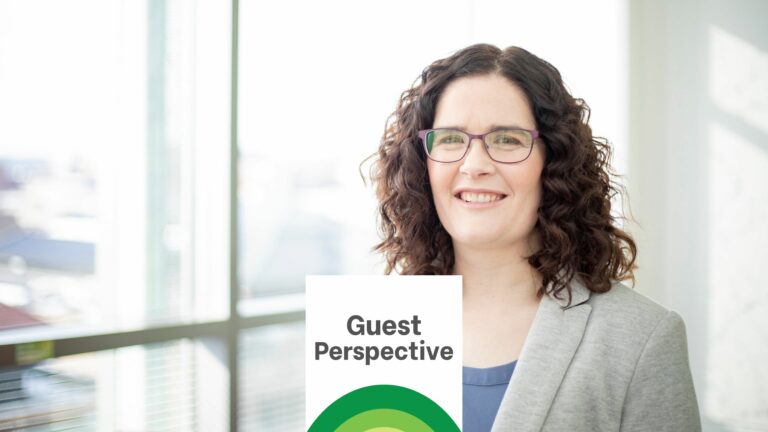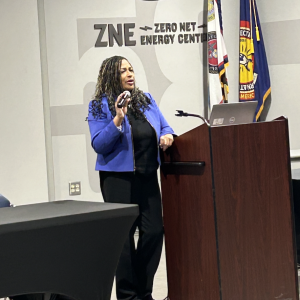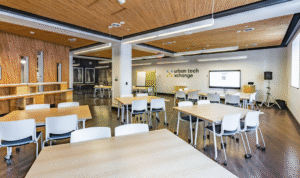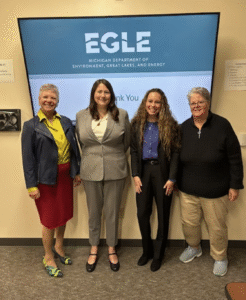
Sara Soderstrom Talks About the Evolution of Sustainability Leadership at the University of Michigan

Sara Soderstrom is an associate professor in Organizational Studies and Program in the Environment and the Erb Undergraduate Fellows faculty director at the University of Michigan.
Sustainability has evolved significantly over the years. At the University of Michigan’s Erb Institute for Sustainability in Business, this evolution includes working toward market transformation: business transforming the market to make it more sustainable. We can’t be thinking only: ‘How do we do less bad? How do we pollute less? How do we use fewer resources?’ We need to actually think about ‘How do we do more good?’
That fundamentally pivots the way that you think about business—it’s much more of a proactive than reactive conversation. It also centers justice in a way that early business sustainability didn’t.
This shift changes the local vs. global dynamic to consider the local as part of the global system, and it sharpens the focus on small and midsize businesses. It also considers supply chains and key stakeholders more broadly.
A study that I conducted with Kathryn Heinze, associate professor in the School of Kinesiology at the University of Michigan, shows some of the ways these shifts are happening. The study focused on the nonprofit FoodLab, which was operating in Detroit at the time. FoodLab aimed to promote healthy, environmentally sustainable, and accessible food systems and to grow a good food economy by working with its members: local food entrepreneurs.
One thing that we realized as we were working with local entrepreneurs was a focus on being embedded in place—what is Detroit? What is the commitment to the city? What is the future for the city we envision? And how do we place ourselves in that future as entrepreneurs? With this network of businesses, there was a strong motivation not just for the financial viability of the business, but for doing good through business.
But at the same time, these entrepreneurs have resource constraints, so there are tradeoffs. How do you balance things like a living wage with ensuring composting or locally sourced materials?
FoodLab helped ease some of these constraints by serving as a connector that lowered the barriers to entry around sustainability. This way, each entrepreneur didn’t need to have all the answers or all the resources—they could get the information they needed about sourcing, financing, or best practices through the network. FoodLab functioned as part incubator, part social movement organization, connecting folks with these shared interests to collectively learn, but also as the space that could aggregate these resources and make them accessible to people, so that they could more effectively move forward towards sustainability and justice goals.
FoodLab asserted that they couldn’t have a just and sustainable food economy if there wasn’t engagement, ownership, and voice from diverse entrepreneurs that reflect the City of Detroit. So they had a lot of intentionality around diversity and engagement, both in who was participating as entrepreneurs in the network, but also in what they were prioritizing as their goals as an organization. It was centering equity and justice in almost every conversation and decision they were having.
The ways that FoodLab built its organizational practices and structured conversations made sure that everyone involved felt like they were heard, even in contentious conversations, which built trust and helped them move collectively towards this more just and sustainable imagined future.
The Erb Institute – a partnership of the Ross School of Business and the School for Environment and Sustainability at the University of Michigan -. works to create a sustainable world through the power of business. Somewhat like FoodLab, we also serve as an enabling network. The students are the key actors, We are the convener, and then the network continues with alumni who are now 10 to 20 years out but still lean into us and each other for support as they work toward solutions to sustainability and justice challenges.
Two of our key programs are:
- Impact Projects, through which students design projects, often working directly with businesses or partnering with businesses and community partners on organization-led projects. The projects give businesses access to students who have time, expertise, and passion around sustainability and justice efforts, who can help them focus on an issue—such as supply chain, procurement, or skills redevelopment.
- Erb on the Road, which brings both graduate and undergraduate students to businesses, nonprofits, and other organizations across Michigan. The program allows students to engage with a variety of different types of businesses and nonprofits that are focused on local sustainability challenges and figure out solutions for them.
For undergrads specifically, what has been powerful is hearing them reflect on learning what is happening locally—which makes what we talked about in the textbook real—but their experiences are helping them recognize that business and sustainability is an available career path. People are committed to sustainability in myriad ways, and you don’t need to wait until you are chief sustainability officer to do sustainability.
The Erb Institute is focused on preparing future leaders – and also service to the state of Michigan. We want students to recognize that being part of the University of Michigan isn’t just the Ann Arbor campus – it’s also the state and world.
So we work to help focus that commitment to: What does it really mean to be the leaders and the best? Supporting and engaging locally in Detroit and across Michigan is part of that.
Be sure to subscribe to our newsletter for regular updates on sustainable business practices in and around Detroit.
Guest
- All
- Business
- Community
- Education
- Events

Citizen Robotics is a Detroit-based nonprofit that advances the use of robotics and digital manufacturing in residential construction, focusing on improving productivity, sustainability, and long-term affordability. Best known for its early work in 3D-printed housing, it explores how alternative construction methods and new financial models can reduce material waste, lower lifetime operating costs, and enhance the resilience of homes. SBN Detroit interviewed Tom Woodman, founder and president of...

Detroit-based OneSix Energy is a clean-energy technology company focused on advancing a lower-carbon approach to hydrogen production. Headquartered at Newlab in Detroit, the startup is developing a proprietary methane pyrolysis system designed to produce hydrogen without carbon dioxide emissions, while also generating solid carbon as a co-product. SBN Detroit interviewed with cofounder Stefan Sysko about the company’s origins, its approach to hydrogen production, and why Detroit is positioned...

Regina Strong serves as Michigan’s first Environmental Justice Public Advocate, leading the state’s Office of the Environmental Justice Public Advocate. Her role focuses on addressing environmental justice concerns raised by communities, helping residents navigate environmental systems, and working across state agencies to improve equity in environmental decision-making. SBN Detroit interviewed Strong about the challenges communities are facing across Michigan and what environmental justice work looks like in practice....







